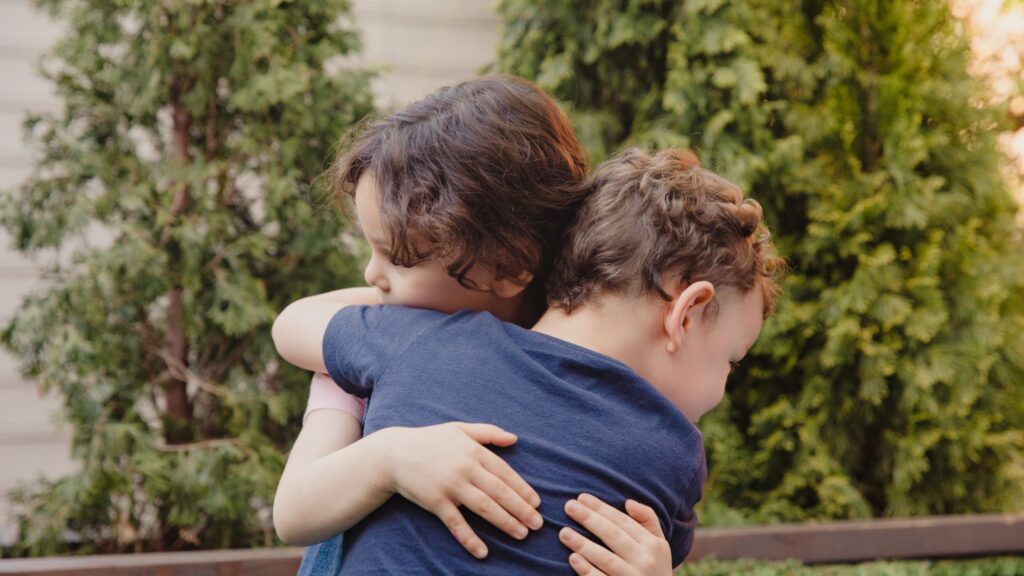Empathy is the heartbeat of human connection, a profound force that bridges our differences and fuels our understanding of one another. At Believe in Me, we are committed to empowering young minds with the self-confidence they need to succeed.
In this blog, we will delve into the art of empathy, exploring its profound importance in shaping the future of our youth. We will share practical insights that parents, caregivers, and educators can embrace. Together, we’ll illuminate why empathy is an essential life skill, capable of sculpting compassionate, resilient, and confident individuals.
What is Empathy?
Empathy is more than just a buzzword; it represents a fundamental life skill with the potential to influence an individual’s personal and social development profoundly. At its essence, empathy is the capacity to put yourself in someone else’s shoes, to feel what they feel, and to understand their perspective. It involves not only recognizing emotions in others but also responding to those emotions with care and consideration.
Empathy comes in different forms:
Cognitive Empathy: This type of empathy involves understanding and recognizing the emotions of others. It’s about perceiving what someone else might be feeling.
Emotional Empathy: Emotional empathy goes further, genuinely allowing you to feel another person’s emotions. It’s the ability to “feel with” someone rather than “feel for” them.
Compassionate Empathy: Compassionate empathy combines cognitive and emotional empathy with a desire to help or support the person experiencing those emotions. It involves taking action to alleviate their distress or support their well-being.
Empathy is not only about identifying and understanding emotions; it’s also about showing kindness, offering support, and fostering connections. Believe in Me believes that by nurturing empathy in young individuals, we empower them to become compassionate, understanding, and emotionally intelligent adults.
Teaching Empathy to Kids: Believe in Me’s Approach
Believe in Me is dedicated to teaching empathy to children through its youth empowerment programs. We understand empathy isn’t an inherent quality but a skill that can be nurtured and improved. Here’s how we approach teaching empathy:
Storytelling and Role-Playing Exercises
Children learn best through stories and interactive experiences. Our programs include the integration of storytelling and role-playing activities that enable children to immerse themselves in the perspectives of others. Through these exercises, they acquire a more profound comprehension of the emotions and encounters of individuals from diverse backgrounds.
Encouraging Open Communication
Effective communication is a cornerstone of empathy. We establish a secure and nurturing atmosphere where children can freely express their thoughts and emotions without hesitation. They learn to listen actively and empathize with their peers through open dialogue.
Promoting Active Listening
Active listening is a vital component of empathy. We teach children to listen attentively, without judgment, and without the intent to respond immediately. This skill enables them to understand the feelings and needs of others better.
Our programs focus on practical, hands-on activities that allow children to practice empathy in real-life situations. Incorporating these strategies, we help children develop the necessary tools to become more empathetic.

Helping Your Child Develop Empathy: Practical Tips
Empathy is a skill that can be nurtured at home and in the community. Parents and caregivers play a significant role in fostering empathy in children. Here are some practical tips to help your child develop empathy:
Model Empathy: Children often learn by example. Demonstrate empathy in your interactions with others. Show compassion, understanding, and kindness in your daily life.
Encourage Perspective-Taking: Encourage your child to consider the feelings and perspectives of others. Ask questions like, “How do you think they feel?” or “What would you do in their shoes?”
Teach Emotional Literacy: Help your child recognize and label emotions. When they experience intense emotions, discuss them and explore how others might feel in similar situations.
Practice Active Listening: Teach your child the art of active listening. Encourage them to listen to what others are saying and ask follow-up questions to show their interest and understanding.
Engage in Empathy-Building Activities: Participate in activities that promote empathy, such as volunteering together or reading books that explore different perspectives and experiences.
Discuss Real-Life Scenarios: Talk to your child about current events or real-life situations that require empathy. Encourage them to think about how they would respond and what actions they could take to help.
The Importance of Showing Empathy
Empathy is not just a nice-to-have skill; it’s essential for personal growth and building meaningful relationships. Here’s why showing empathy is so important:
Strengthening Relationships
Empathetic individuals tend to have stronger, more positive relationships with others. They are better at resolving conflicts and offering support when needed.
Fostering Emotional Intelligence
Empathy is a critical component of emotional intelligence. It allows individuals to navigate complex emotions, both their own and those of others, effectively.
Building Trust and Respect
People are more likely to trust and respect those who demonstrate empathy. It creates a sense of understanding and mutual respect.
Making a Positive Impact
Empathetic individuals often act to impact their communities and the world positively. They are more likely to engage in acts of kindness and social change.
Reducing Bullying and Conflict
Empathy can reduce bullying and conflict by promoting understanding and tolerance. It helps individuals recognize the consequences of their actions on others.
Believe in Me has witnessed firsthand how the practice of empathy can transform the lives of young individuals. Through our programs, we have seen children become more compassionate, confident, and socially aware.

Believe in Me’s Commitment to Diversity & Inclusion
Believe in Me’s vision extends beyond just nurturing empathy; it encompasses creating a diverse, inclusive, and equitable environment where every child can thrive. Our core belief is that diversity should be celebrated, and everyone should have equal opportunities for growth and success.
Our Views on Diversity & Inclusion
At Believe in Me, we are steadfast in our commitment to upholding equal opportunities for all, irrespective of background or circumstances. Our unwavering dedication extends to creating a nurturing community that celebrates individuality, nurturing an environment for survival, meaningful growth, and realizing personal potential.
Our Diversity, Equity, and Inclusion (DEI) Policy outlines our commitment to these principles. We actively seek to ensure that our programs, resources, and staff reflect the diversity of the communities we serve. By embracing differences and fostering inclusion, we create a more prosperous, vibrant environment for all children to thrive.
Empathy at the Heart of Youth Empowerment
Empathy is a transformative skill that can shape the future of our youth, and Believe in Me is leading the way in empowering children with this essential tool. We are positively impacting young individuals ‘ lives through our youth empowerment programs, commitment to diversity and inclusion, and dedication to nurturing empathy.
Empowering youth through empathy is not just a goal; it’s a mission that Believe in Me embraces wholeheartedly. Teaching empathy, fostering compassion, and celebrating diversity pave the way for a brighter, more inclusive future for all children. Join us in our journey to empower the youth and believe in their potential to succeed. Together, we can make a difference.


